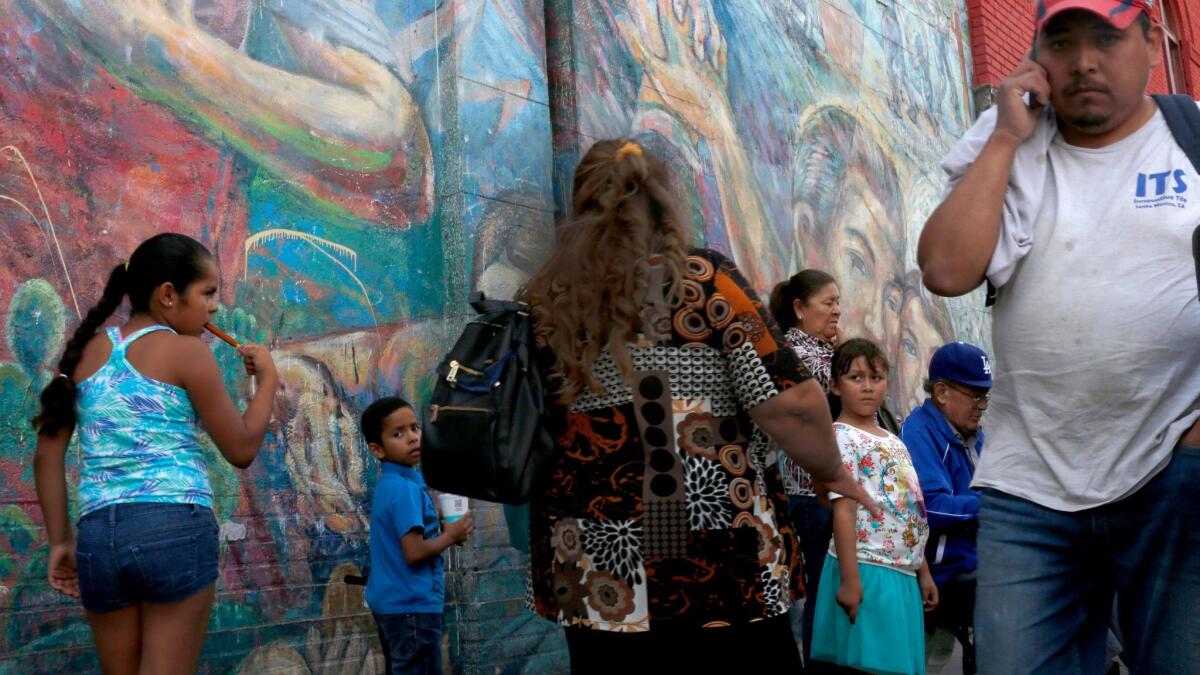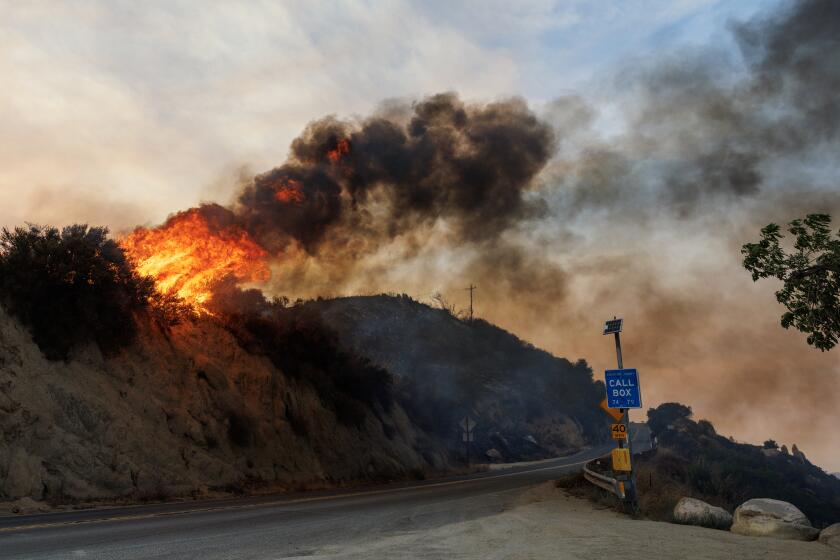Column: ‘The children are afraid’: L.A. Latinos fear a Trump presidency

It was supposed to be a party.
“Celebrating democracy,” said the sign on the gates of Dolores Mission in Boyle Heights, where a couple of hundred people gathered in the courtyard to watch election results on a big-screen TV Tuesday night.
This community had a lot at stake. It’s home to thousands of Latinos, and has been for decades. They work tough jobs, pack their kids off to school and hope the youngsters will one day find more opportunity than they ever did.
And many of those people have been on edge since Donald Trump emerged on the political scene more than a year ago, talking about Latinos in a way that made those here illegally, and legally, tremble at the thought of a victory by him.
“I’ve just been praying, every night. Dear Lord, please do not let that man lead this country,” said Rita Chairez, a parishioner.
“The children are afraid,” said Ellie Hidalgo, pastoral associate.
They were born here, but their parents weren’t, Hidalgo said. And the kids fear their parents will be rounded up and booted across the border by Trump.
There’s also fear, she said, among those who were brought into the country illegally as minors, grew up unaware of their status in many cases, and were given temporary lawful status by President Obama.
“We have a lot of them, and they have jobs,” Hidalgo said.
If this is what those who voted for Trump wanted — the breakup of families — they’ll now have a chance to see it happen.
I suspect there was more to it than that. Trump supporters wanted to deliver a blow to the status quo in Washington, and they wanted to believe there was a fix for what wasn’t working for them. Their jobs had disappeared, their wages had grown stagnant.
I can understand the desire for change, and for better days. But the man who promised transformation — with shockingly little detail about how he’d make it all happen — also insulted and maligned people.
The black president was born in Africa.
Women were objects.
Mexico was sending its worst people north.
It wasn’t just the words that scared Boyle Heights, it was the fact that anyone could say the things he said and have a shot at being president. The rise of a more diverse nation had given them hope of a more tolerant society, but it seemed to have unleashed a backlash against that very thing.
“How can a human being talk the way Trump talks about us?” Chairez asked. “He talks like we’re not human, Latinos and women both.”
As the night wore on, and Trump put a grip on Florida, Ohio and other states, the mood darkened. People stopped talking to each other as they watched the news, eyes downcast, arms folded. Father Mike Lee, associate pastor, went from table to table to check in with his parishioners, as if to buck them up.
“I do not want to live, and never wanted to live, in a totalitarian regime,” Father Lee told me. “It’s very frightening to me and I’ll be honest with you: I don’t want to have a President Trump. He’s a businessman. He has no real knowledge of how government works. As someone who got an A in U.S. history in high school, and in college, I know a lot more about government than he does, and that’s frightening beyond words.”
When Trump first spoke of deportations and building a wall, attendance at a weekly Dolores Mission legal clinic spiked, Father Lee said. People wanted to update immigration records and register to vote.
And they did, even though they knew that in heavily Democratic California, their voice might not make a difference.
The election night “celebration” was hosted in part by L.A. Voice, a nonprofit that works with congregations to get out the vote and work on economic and social justice campaigns. Joseph Tomas McKellar, who works with L.A. Voice and whose family grew up in Boyle Heights, said he didn’t think a Trump victory was entirely unexpected.
“People of color have known, based on living in communities like this one, that things aren’t equal,” he said.
For poor and middle-class voters who have been standing in line to cash in on the American dream, McKellar said, the line wasn’t moving.
“People of color are in that line now, and the narrative is that they cut,” McKellar said.
By 9 p.m., Trump was on a run, and the tables at Dolores Mission were clearing out.
The party had turned into a funeral.
I looked for Rita Chairez, but she was already gone, her prayers unanswered.
To read the article in Spanish, click here
Get more of Steve Lopez’s work and follow him on Twitter @LATstevelopez
ALSO
When reality set in for Clinton supporters
Trump’s election lead causing deep anxiety in Mexico
How Donald Trump put together such a strong showing in the presidential election results
More to Read
Sign up for Essential California
The most important California stories and recommendations in your inbox every morning.
You may occasionally receive promotional content from the Los Angeles Times.











